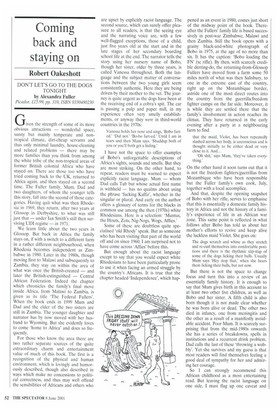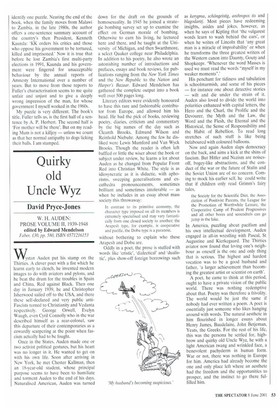Coming back and staying on
Robert Oakeshott
DON'T LET'S GO TO THE DOGS TONIGHT by Alexandra Fuller Picador, .f15.99, pp. 310, ISBN 0330480230 Given the strength of some of its more obvious attractions — wonderful space, sunny but mainly temperate and nontropical climate, dirt-cheap servants and thus only minimal laundry, house-cleaning and related problems — there may be more families than you think from among the white tribe of the non-tropical areas of former British colonial Africa who have stayed on. There are those too who have tried coming back to the UK, returned to Africa again, and then stayed on a second time. The Fuller family, Mum, Dad and two daughters, of whom the younger tells this story, fall into the second of those categories. Having quit what was then Rhodesia in 1969, they return, after two years at Glossop in Derbyshire, to what was still just that — under Ian Smith's still then surviving UDI regime — in 1971.
We learn little about the two years in Glossop. But back in Africa the family stays on, if with a switch to a different farm in a rather different neighbourhood, when Rhodesia becomes independent as Zimbabwe in 1980. Later in the 1980s, though moving first to Malawi and subsequently to Zambia, they stay on within the area of what was once the British-created — and later the British-extinguished — Central African Federation. Indeed the chapter which chronicles the family's final move inside Africa. from Malawi to Zambia, is given as its title 'The Federal Fullers'. When the book ends in 1999 Mum and Dad and the elder of the two sisters are still in Zambia. The younger daughter and narrator has by now moved with her husband to Wyoming. But she evidently loves to come 'home to Africa' and does so frequently.
For those who know the area there are two rather separate sources of the quite extraordinary charm and entertainment value of much of this book. The first is a recognition of the physical and human environment, which is lovingly and humorously described, though also described in ways which make no concessions to political correctness, and thus may well offend the sensibilities of Africans and others who
are upset by explicitly racist language. The second source, which can surely offer pleasure to all readers, is that the seeing eye and the narrating voice are, with a few well-flagged exceptions, those of a child, just five years old at the start and in the late stages of her secondary boarding school life at the end. The narrator tells the story using her nursery name of Bobo, though her sister, older by three years, is called Vanessa throughout. Both the language and the subject matter of conversations between the two young girls seem consistently authentic. Here they are being driven by their mother to the vet. The journey is quite urgent as the dogs have been at the receiving end of a cobra's spit. The car is passing a pulp and paper mill, in my experience often very smelly establishments, or anyway they were in third-world countries in the 1970s:
Vanessa holds her nose and sings, 'Bobo fatted.' Did not.' Bo-bo fart-ed.' Until I am in tears and then Mum says, `Shuddup both of you or you'll both get a hiding.'
I have not the space to offer examples of Bobo's unforgettable descriptions of Africa's sights, sounds and smells. But they are most striking. On the other hand, to repeat, readers must be warned to expect explicitly racist language. Mum — whom Dad calls Tub but whose actual first name is withheld — has no qualms about using the phrase 'fucking Kaffir', whether in the singular or plural. And early on the author offers a glossary of terms for the blacks in common use among the then (1970s) white Rhodesians. Here is a selection: `Muntus, the Houts, Zots, Nig-Nogs, Wogs, Affies.'
Some of these are doubtless quite specialised 'old Rhody' speak. But as someone who has been visiting that part of the world off and on since 1960, I am surprised not to have come across 'Affies' before this.
But enough about the racist language except to say that you would expect white Rhodesians to have been particularly prone to use it when facing an armed struggle by the country's Africans. It is true that the chapter headed 'Independence', which hap
pened as an event in 1980, comes just short of the midway point of the book. Thereafter the Fullers' family life is based successively in post-war Zimbabwe, Malawi and then Zambia. Still the book opens with a grainy black-and-white photograph of Bobo in 1975, at the age of no more than six. It has the caption: 'Bobo loading the FN' (Sc rifle). By then, with scarcely credible derring-do, the returning-from-Glossop Fullers have moved from a farm some 50 miles north of what was then Salisbury, to one in the extreme east of the country, right up on the Mozambique border, astride one of the most direct routes into the country from the guerrilla/freedom fighter camps on the far side. Moreover, it is while they are settled there that the family's involvement in action reaches its climax. They have returned in the early evening after a party at a neighbouring farm to find
that the maid, Violet, has been repeatedly slashed across her body, is unconscious and is thought initially to be either dead or very close to it. And...
'Oh shit,' says Mum, 'they've taken everything.'
On the other hand it soon turns out that it is not the freedom fighters/guerrillas from Mozambique who have been responsible but the Fuller family's own cook, July, together with a local accomplice.
And that, despite the opening snapshot of Bobo with her rifle, serves to emphasise that this is essentially a domestic family history in Africa and not the history of a family's experience of life in an African war zone. This same point is reflected in what follows after Bobo has told us about her mother's efforts to revive and keep alive the luckless maid Violet. She goes on:
The dogs scratch and whine as they stretch and re-curl themselves into comfortable positions and there is the rhythmic slip-slap of some of the dogs licking their balls. Usually Mum says 'Hey stop that,' when she hears them licking their balls, but not now.
But there is not the space to change focus and turn this into a review of an essentially family history. It is enough to say that Mum gives birth in this account to at least two other live children, as well as Bobo and her sister. A fifth child is also born though it is not made clear whether he was born alive or dead. The other two died in infancy, one from meningitis and the other as a result of a manifestly avoidable accident. Poor Mum. It is scarcely surprising that from the mid-1980s onwards she has a series of breakdowns, spells in institutions and a recurrent drink problem. Dad calls the last of these 'throwing a wobbly'. Yet she survives and my guess is that most readers will find themselves feeling a good deal of sympathy for her and admiring her courage.
So I can strongly recommend this African childhood as a most entertaining read. But leaving the racist language on one side, I must flag up one caveat and
identify one puzzle. Nearing the end of the book, when the family moves from Malawi to Zambia. in the late 1980s, the author offers a one-sentence summary account of the country's then President, Kenneth Kaunda: 'KK orders his critics and those who oppose his government to be tortured, killed and imprisoned.' Now it is true that before he lost Zambia's first multi-party elections in 1991, Kaunda and his government were fingered for unacceptable behaviour by the annual reports of Amnesty International over a number of years. But to move from those reports to Fuller's characterisation seems to me quite unfair and unjust and to give a deeply wrong impression of the man, for whose government I myself worked in the 1960s.
My puzzle is very different. The book's title. Fuller tells us, is the first half of a sentence by A. P. Herbert. The second half is 'For mother will be there'. But on my reading Mum is not a killjoy — unless we count as that her normal antipathy to dogs licking their balls. I am stumped.























































































 Previous page
Previous page